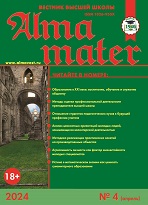UDC 16:37.09
https://doi.org/10.20339/AM.09-22.033
Natalya P. Sukhanova, PhD (Philosophy), Docent, Associate Professor of Department of Philosophy and Humanities at Novosibirsk State University of Economics and Management,
е-mail: konfngi@yandex.ru
The study of critical thinking is carried out through the prism of the program “Logic and Critical Thinking”. The search for methodological foundations of modern pedagogy is undertaken through an appeal to the tradition of postmodernism. Among the postmodern ideas, the idea of “experience” stands out in all its diversity, which takes place in the learning process. The variability of experience authorizes the rejection of intellectual pressure and the possibility of methodological pluralism in the choice of teaching methods and approaches. Anti-pedagogy, postmodernly oriented in its theory and practice on the principles of “experiential learning”, contains grounds for the development of a problem-oriented method, considered as a trigger mechanism in the cognitive process aimed at the formation of critical thinking skills. The effective practice of implementing the problem approach in the development of intellectual, linguistic, logical dispositions of the personality of students and their transformation into a research community is shown. The conclusion is made about the priority of the problem-oriented method in teaching the art of thinking critically.
Key words: critical thinking, logic, problem-oriented method, education, anti-pedagogy, postmodernism.
References
1. Bykova, A.S., Sakharova, N.S., Kirillova, I.K. Modern trends in the interpretation of the concept of “critical thinking”. Bulletin of the Orenburg State University. 2021. No. 3 (231). P. 6–11. DOI: 10.25198/1814-6457-231-6
2. Kamenev, S.V. From prescriptions to proposals: Russian education in the ways of reforming. Historical, philosophical, political and legal sciences, culturology and art history. Problems of theory and practice. 2017. No. 12-4 (86). P. 75–78.
3. Karpov A.O. Modern Theory of Scientific Education: Problems of Formation. Problems of Philosophy. 2010. No. 5. P. 15–24.
4. Lau, Joe Y.F. Introduction to Critical Thinking and the Theory of Creativity. Moscow: Exmo, 2017. 368 p.
5. Nekrasova, N.A., Nekrasov, S.I., Klepatsky, V.V. Philosophical Analysis of Peculiarities and Possibilities of Critical Thinking. Bulletin of Tver State University. Series: Philosophy. 2022. No. 1 (59). P. 79–86. DOI: 10.26456/vtphilos/2022.1.079
6. Ogurtsov, A.P. Antipedagogics: The Challenge of Postmodernism. Vysshee Obrazovanie v Rossii. 2002. No. 5. P. 79–86.
7. Rybakov, S.Y., Stepanov, I.I. Postmodernism in pedagogy as a reflection of the fundamental anthropological crisis. Spiritual and Moral Education. 2021. No. 4. P. 3–8.
8. Sukhanova, N.P. Problem method in the realization of critical thinking project. Problems of modern education. 2022. No. 1. P. 23–30. DOI: 10.31862/2218-8711-2022-1-23-30
9. Yulina, N.S. Philosophy for children. Moscow: Kanon+ ROOI Rehabilitation, 2005. 464 p.
10. Doll, W.E. A Post-Modern Perspective on Curriculum. Teachers College Press, 1993. 232 p.
11. Lipman, M. Thinking in education. Cambridge: Cambridge University Press, 2001. 316 р.











.png)






